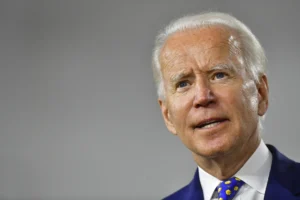US prepares next phase of strikes against Iran.
US prepares next phase of strikes against Iran as the Biden administration on Saturday was facing calls from hawkish Republicans to go further in its military campaign against Iran-backed militias in Iraq and Syria, even though US officials have made it clear additional actions are imminent.
Supersonic B-1 bombers flew non-stop from the US on Friday night to strike dozens of targets in Iraq and Syria in the opening phase of a retaliatory response to a drone attack that killed three American troops in Jordan on January 28.

President Joe Biden said additional strikes would come “at times and places of our choosing” and Defence Secretary Lloyd Austin said Friday night’s action was only “the start of our response”.
The strikes targeted facilities operated by Iran’s Islamic Revolutionary Guard Corps (IRGC) and other Iran-backed militias, and about 40 people were reportedly killed in Iraq and Syria.
Mr Biden has repeatedly said the response is calibrated to avoid escalation with Iran and stressed he doesn’t seek a war with Tehran even after the militia groups have launched more than 160 attacks against US forces in Iraq, Syria and Jordan in recent months.
You may also be interested in:
https://kampalavibes.com/pentagon-launched-military-operation-in-the-middle-east/
US prepares next phase of strikes against Iran, But many from the Republican Party, which has long pushed for hawkish relations with Tehran, want to see Mr Biden do more.
“These military strikes are welcome, but come far too late for the three brave Americans who died and the nearly 50 wounded,” said Roger Wicker, the top Republican on the Senate Armed Services Committee.
“Iran and its proxies have tried to kill American soldiers and sink our warships 165 times while the Biden administration congratulates itself for doing the bare minimum. Instead of giving the Ayatollah the bloody nose that he deserves, we continue to give him a slap on the wrist.”
Syria expert Charles Lister, a senior fellow at the Middle East Institute, said that although Friday’s strikes represented the most expansive US military action against Iran’s proxies in Iraq and Syria since the Iraq war, it was clear they would not stop future attacks
“Ultimately, Iran is engaged, both directly and through its proxies, in a campaign of attrition against the US and events in the last few days represent little more than a hiccup in that broader effort,” Mr Lister said.
“Should the next rounds of US military action be more assertive, and if they target Iranian operatives, we might be able to start to consider a more strategic effect in terms of deterrence, but we’re definitely not there yet.”
Senator Pete Ricketts, who sits on the Senate Committee on Foreign Relations, said that to restore effective deterrence, “President Biden must hit Iran where it hurts”.
“Weak, telegraphed responses will not cut it. We need leadership, not appeasement,” he said.
Notably absent from the Republican criticism, however, was the usually voluble Donald Trump, the putative Republican nominee to run for president in November. He has long sought to pull US forces from the Middle East and has struck an isolationist tone at odds with the traditional hawkish wing of his party.
The response thus far appears to be designed not to entirely destroy the Iran-backed militias’ capabilities, but to degrade their arsenals and weaken their ability to continue to strike.
“The goal here is to get these attacks to stop. We’re not looking for a war with Iran,” National Security Council spokesman John Kirby told reporters.
An Iraqi militia official on Saturday hinted at a desire to de-escalate tensions in the Middle East.
Hussein Al Mosawi, an official for Harakat al-Nujaba, one of the main Iranian-backed militias in Iraq, condemned the US strikes, saying Washington “must understand that every action elicits a reaction.”
But he then struck a more conciliatory tone, telling the Associated Press that “we do not wish to escalate or widen regional tensions”








